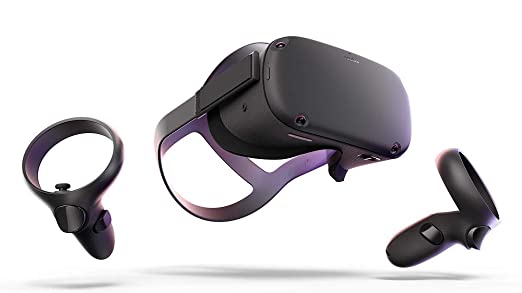Oculus Quest vs HTC VIVE Focus
When you compare the Oculus Quest to the HTC VIVE Focus you can see which VR Headset is better. Let's take a look of the comparison, and see which model of VR Headset out ontop.
 Oculus Quest
Oculus Quest4.5
Based on 1 reviews
What VR Headset is better?
The Oculus Quest and the HTC VIVE Focus are both standalone virtual reality headsets, offering users immersive experiences with cutting-edge technology. Comparing the two, we can identify some distinct differences in specs that may sway you one way or another when deciding which headset to buy.
Starting with field of view, the Oculus Quest has a narrower 95° range while the HTC VIVE Focus offers an expanded 110°. This means the VIVE Focus will offer a more immersive experience, however this increased field of view comes at a cost: resolution. The Oculus Quest has 1600 x 1440px resolution compared to 2880 x 1600 px on the VIVE Focus. While it’s true that you won’t get quite as sharp images on the Oculus Quest as you would with its counterpart, I find that this is still plenty for most VR applications and doesn't really detract from my experience using it.
Room scale tracking is also something to consider when comparing these two headsets. Both feature 360-degree tracking but only have 4 cameras between them for tracking your movements – so if you plan on playing larger multiplayer games or running around multiple rooms then I would suggest going for the HTC VIVE Focus which features 6 cameras instead of 4 on the Oculus Quest – this should provide greater accuracy in tracking your movements and help make sure your gaming experience runs smoothly no matter what environment you're in.
Finally, let’s look at refresh rate; both headsets have respectable refresh rates – 72 Hz for Oculus Quest and 75 Hz for HTC VIVE focus – though I do think higher refresh rates are needed for truly seamless gaming experiences in VR (at least 90+ Hz). That said, I don’t believe either headset has any major issue in this area due to their respective refresh rates being above average compared to other competitors on the market today (the industry standard tends to be somewhere around 60 Hz).
Overall I found both devices incredibly impressive and certainly worth considering if you're looking into buying a standalone virtual reality headset! For me personally I slightly prefer using the HTC Vive Focus due to its improved room scale tracking capabilities, though ultimately it depends heavily upon individual preference when deciding between these two amazing devices!
Specs comparison between the two VR Headsets
| Oculus Quest | HTC VIVE Focus | |
|---|---|---|
| Overview | ||
| Brand | Meta | HTC |
| Model Name | Quest | VIVE Focus |
| Release Date | 2019 | 2018 |
| Country of Origin | United States | Taiwan |
| Category | Standalone VR | Standalone VR |
| Battery Life | 3 h | 3 h |
| Display | ||
| Field of View | 95° | 110° |
| Resolution | 1600 × 1440 px (per eye) | 2880 × 1600 px |
| Refresh Rate | 72 Hz | 75 Hz |
| Display Type | OLED | AMOLED |
| Minimum Requirements | ||
| Min. CPU Required | Intel i5-4590 or AMD Ryzen 5 1500X or greater | |
| Min. Graphics Required | Nvidia Titan X GTX 1060 or GTX 1070 or RTX 20 series | |
| Min. RAM Required | 8 GB | |
| Operating Systems | Microsoft Windows | |
| Sizing | ||
| Weight | 571 g | |
| Dimensions | 190.5 x 104.14 x 114.3 mm | |
| Features | ||
| Room Scale? | YES | YES |
| 360 Tracking? | YES | YES |
| Positional Tracking? | YES | YES |
| Front Camera? | No | YES |
| Eye Tracking? | No | |
| Usable with Glasses? | YES | |
| Cooling System | YES | |
| Built in Headphones? | YES | |
| Built in Microphone? | YES | YES |
| Flip Visor? | YES | |
| Voice Command? | YES | |
| IPD Adjustment? | YES | |
| Lens to Eye Adjustment? | No | YES |
| USB? | YES | YES |
| MicroUSB? | no | |
| Display Port? | YES | |
| Mini Display Port? | No | |
| HDMI? | No | |
| MicroSD? | No | |
| Bluetooth? | YES | YES |
| Wifi? | YES | YES |
